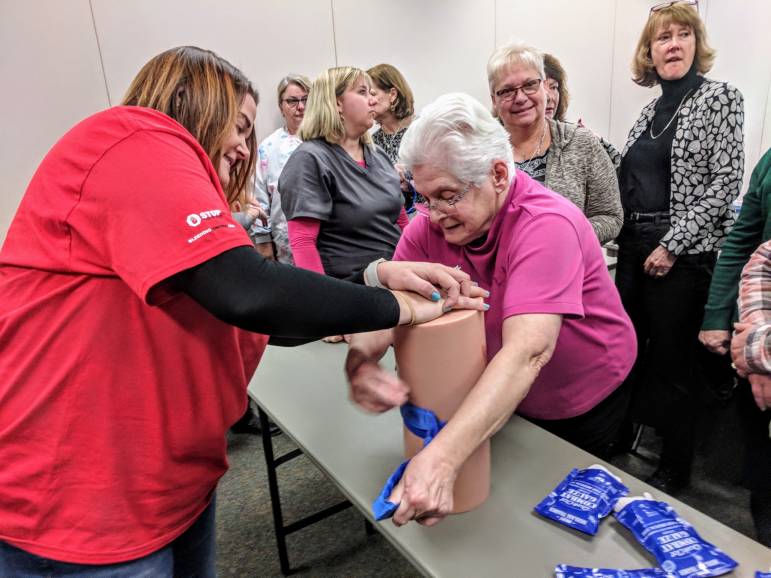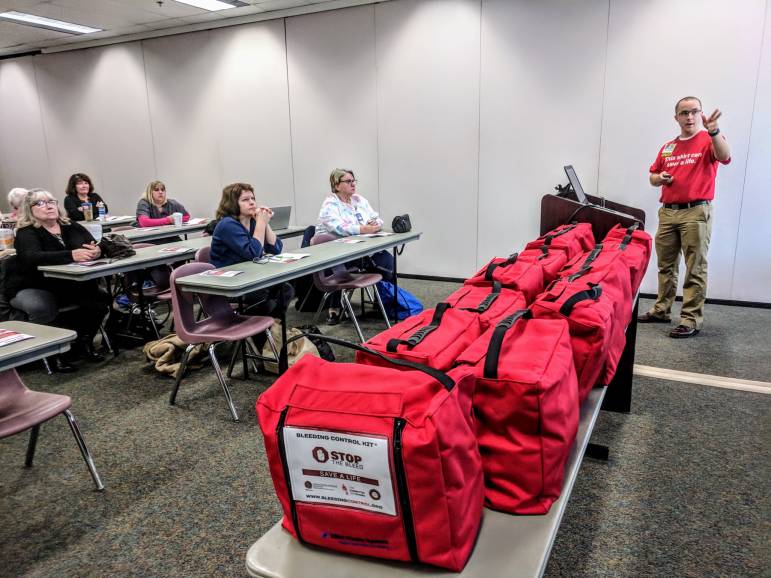
MANCHESTER, NH – There’s nothing like a good hands-on session about handling a mass casualty situation to remind you that you’re more than a school nurse; now, you’re a first responder.
That was the message for 25 district school nurses, who were deputized Tuesday as first responders at their schools during a free training session at the city health department, called Stop the Bleed. The program, funded by Elliot Health System, provided two hours of free training, including a refresher course on how to quickly address the kind of traumatic wounds that can happen in a school or public setting, and an emergency kit to take back to their schools.
⇒Check out Manchester School Nurses in action via Facebook Live!
The program was born out of the 2014 tragedy at Sandy Hook in Connecticut, says Adam Rembisz, Trauma Program Manager at the Elliot. It has been four years since the deadly shooting incident that left 20 students and six staff dead.
“As they say, the only thing more tragic than a death is a death that could have been prevented. We know that nine kids who needed trauma care during Sandy Hook might have survived if there had been this kind of help available,” Rembisz says.

There have been enough mass shootings in public spaces around the country that preparedness training means making sure as many people as possible can react with rudimentary medical care. That means being educated in how to stop bleeding and stabilize a patient until medical crews arrive are available.
Rembisz, who calls himself a “big trauma nerd,” started as an EMT while still in high school. Being able to bring this kind of training into the city’s schools by way of nurses, is professionally fulfilling.
“Nurses and paramedics can teach it, and we’d like to get it out to community,” says Rembisz. “It’s kind of like CPR training, so why not be prepared with other forms of first aid. This training will save more lives down the road than CPR.”
Pat McBride, a nurse at Parker-Varney, got a chance to perfect her wrapping technique using a C-A-T tourniquet on a fake leg. The tourniquets were developed for use by the military as a more efficient and effective way of stopping bleeding than a Latex tie, or makeshift tourniquet. She and her fellow school nurses were guided in the technique by members of Elliot’s ICU and ER nursing staff.
McBride, who spent most of her career as an OR nurse, said she liked the updated tourniquet, which employs Velcro and a tightening mechanism that is simple to use. Although the day-to-day stuff of being a school nurse is mostly fixable with Band-aids and bedside manner, McBride says the thought that something like Sandy Hook could happen here is always in the back of her mind.

“This training is great. It gives you one more tool to work with,” McBride says.
Rembisz said he learned about the training program through the American College of Surgeons, and spearheaded the effort to allocate $20,000 of his budget to the program. Each nurse went back to school with a $650 Stop the Bleed emergency bag that includes eight prepackaged kits, each with a booklet, combat-grade tourniquets, dressing, protective gloves and compression bandages.
There is one kit for each Manchester elementary and middle school, and two each for the high schools, at no cost to the school district.
Rembisz says the training program can be tailored to large companies, scout troops, or colleges and universities. He’s already reached out to the Manchester Boston/Regional Airport, the SNHU Arena and will be doing a session with the Bedford CERT (Community Emergency Response Team.)
“TSA agents have zero training for such emergencies. Placing Stop the Bleed bags at the airport, coupled with training, would provide the tools necessary so that a TSA or or ticketing agent could provide emergency first aid,” Rembisz says. “The innovation of this program is in the education component, teaching people they can save a life. Being prepared for a mass casualty event is not an issue until it’s an issue.”
For more information on the Stop the Bleed program, contact Rembisz at arembisz@elliot-hs.org







